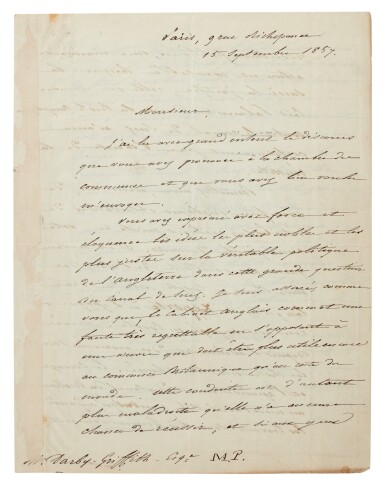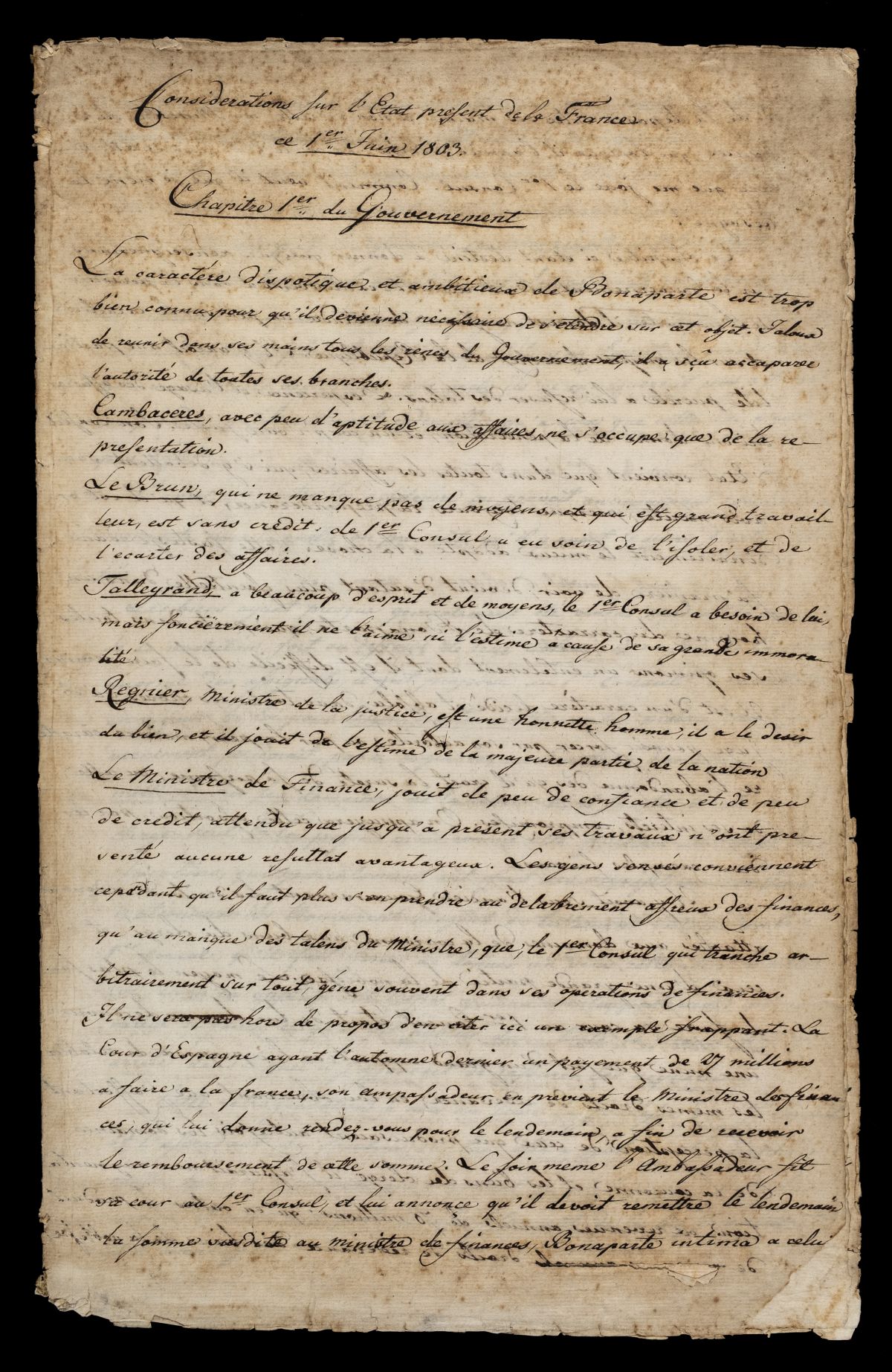HERSCHEL, John Frederick William (1792–1871). Autograph draft manuscript, "An Address to the British Association for the Advancement of Science at the opening of their meeting at Cambridge, June 19th, 1845," [London, before 19 June 1845]. 64 pages, 225 x 143 mm, with numerous insertions, deletions, and corrections. Blue paper-chemise and half black morocco clamshell. Sir John Herschel’s draft of his remarkable inaugural presidential address delivered at the 1845 meeting of the British Association for the Advancement of Science at Cambridge University. Herschel presents a comprehensive survey of the state of the sciences, with particular emphasis on advances in mathematics, chemistry, astronomy, cosmology, physics, and the emerging science of thermodynamics. The draft differs importantly from his final, published text, including substantial passages that were deleted in the draft. Many of these deleted passages refer to named scientists, and render the Address much more detailed and specific in its references. Following his introductory remarks, Herschel discusses the advances recently made in mathematics, and in particular the work of Cayley, William Hamilton’s theory of quaternions, and George Boole’s investigations into mathematical logic: "Conceptions of a novel and refined kind have thus been introduced into analysis — new forms of imaginary expression rendered familiar — and a vein opened which I cannot but believe will terminate in some first-rate discovery in abstract science. Neither are inquiries into the logic of symbolic analysis ... devoid of a bearing on the progress even of physical science..." He goes on to discuss in particular The Cambridge Mathematical Journal, which published Boole’s most important papers. He outlines a course of global scientific research in several areas, including geomagnetism and meteorology, and he emphasizes the importance of international co-operation and of long-term investment and patience in producing results. This is followed by a discussion of the economics of government sponsorship of scientific research, and its advantages to the nation. He focuses on the dual and sometimes conflicting necessities of amassing data, and the coherent analysis and reduction to theory of that data. "Witness the piles of unreduced meteorological observations which load our shelves and archives; witness the immense and admirably arranged catalogues of stars which have been and still are pouring in from all quarters upon our astronomy so soon as the want of extensive catalogues came to be felt and declared. What we now want is thought, steadily directed to single objects…." "Speaking in a utilitarian point of view, the globe which we inhabit is quite as important a subject of scientific inquiry as the stars. We depend for our bread of life and every comfort on its climates and seasons, on the movements of its winds and waters. We guide ourselves over the ocean, when astronomical observations fail, by our knowledge of the laws of its magnetism; we learn the sublimest lessons from the records of its geological history; and the great facts which its figure, magnitude, and attraction, offer to mathematical inquiry, form the very basis of Astronomy itself." Herschel then discusses the invention and application of automatic recording devices and, alluding to the work of his colleague Charles Babbage, machines for performing arithmetic calculations and automatically recording their results, foreseeing how "these contrivances promise to become of immense utility." Herschel then considers the importance of voyages of exploration to scientific advance, and remarks that "a ship is an itinerant observatory…" Being the premier astronomer of his time, Herschel (unsurprisingly) discusses at length advances in astronomy, and the outstanding problems needing resolution, particularly in relation to galaxies, the size and possible infinity of the universe, etc. Describing the newly completed six-foot reflector of the Ea
HERSCHEL, John Frederick William (1792–1871). Autograph draft manuscript, "An Address to the British Association for the Advancement of Science at the opening of their meeting at Cambridge, June 19th, 1845," [London, before 19 June 1845]. 64 pages, 225 x 143 mm, with numerous insertions, deletions, and corrections. Blue paper-chemise and half black morocco clamshell. Sir John Herschel’s draft of his remarkable inaugural presidential address delivered at the 1845 meeting of the British Association for the Advancement of Science at Cambridge University. Herschel presents a comprehensive survey of the state of the sciences, with particular emphasis on advances in mathematics, chemistry, astronomy, cosmology, physics, and the emerging science of thermodynamics. The draft differs importantly from his final, published text, including substantial passages that were deleted in the draft. Many of these deleted passages refer to named scientists, and render the Address much more detailed and specific in its references. Following his introductory remarks, Herschel discusses the advances recently made in mathematics, and in particular the work of Cayley, William Hamilton’s theory of quaternions, and George Boole’s investigations into mathematical logic: "Conceptions of a novel and refined kind have thus been introduced into analysis — new forms of imaginary expression rendered familiar — and a vein opened which I cannot but believe will terminate in some first-rate discovery in abstract science. Neither are inquiries into the logic of symbolic analysis ... devoid of a bearing on the progress even of physical science..." He goes on to discuss in particular The Cambridge Mathematical Journal, which published Boole’s most important papers. He outlines a course of global scientific research in several areas, including geomagnetism and meteorology, and he emphasizes the importance of international co-operation and of long-term investment and patience in producing results. This is followed by a discussion of the economics of government sponsorship of scientific research, and its advantages to the nation. He focuses on the dual and sometimes conflicting necessities of amassing data, and the coherent analysis and reduction to theory of that data. "Witness the piles of unreduced meteorological observations which load our shelves and archives; witness the immense and admirably arranged catalogues of stars which have been and still are pouring in from all quarters upon our astronomy so soon as the want of extensive catalogues came to be felt and declared. What we now want is thought, steadily directed to single objects…." "Speaking in a utilitarian point of view, the globe which we inhabit is quite as important a subject of scientific inquiry as the stars. We depend for our bread of life and every comfort on its climates and seasons, on the movements of its winds and waters. We guide ourselves over the ocean, when astronomical observations fail, by our knowledge of the laws of its magnetism; we learn the sublimest lessons from the records of its geological history; and the great facts which its figure, magnitude, and attraction, offer to mathematical inquiry, form the very basis of Astronomy itself." Herschel then discusses the invention and application of automatic recording devices and, alluding to the work of his colleague Charles Babbage, machines for performing arithmetic calculations and automatically recording their results, foreseeing how "these contrivances promise to become of immense utility." Herschel then considers the importance of voyages of exploration to scientific advance, and remarks that "a ship is an itinerant observatory…" Being the premier astronomer of his time, Herschel (unsurprisingly) discusses at length advances in astronomy, and the outstanding problems needing resolution, particularly in relation to galaxies, the size and possible infinity of the universe, etc. Describing the newly completed six-foot reflector of the Ea
.jpg?height=400)











.jpg)


Try LotSearch and its premium features for 7 days - without any costs!
Be notified automatically about new items in upcoming auctions.
Create an alert